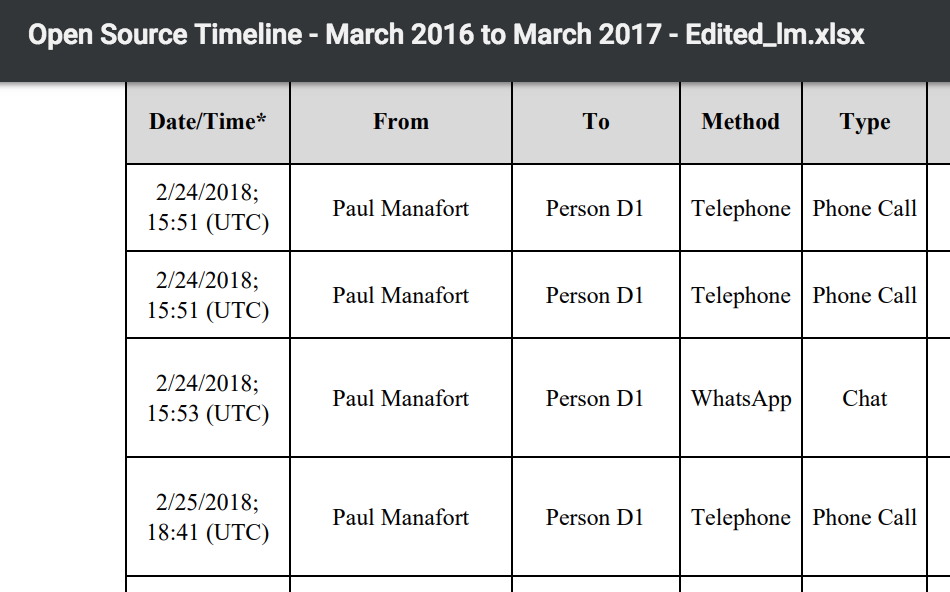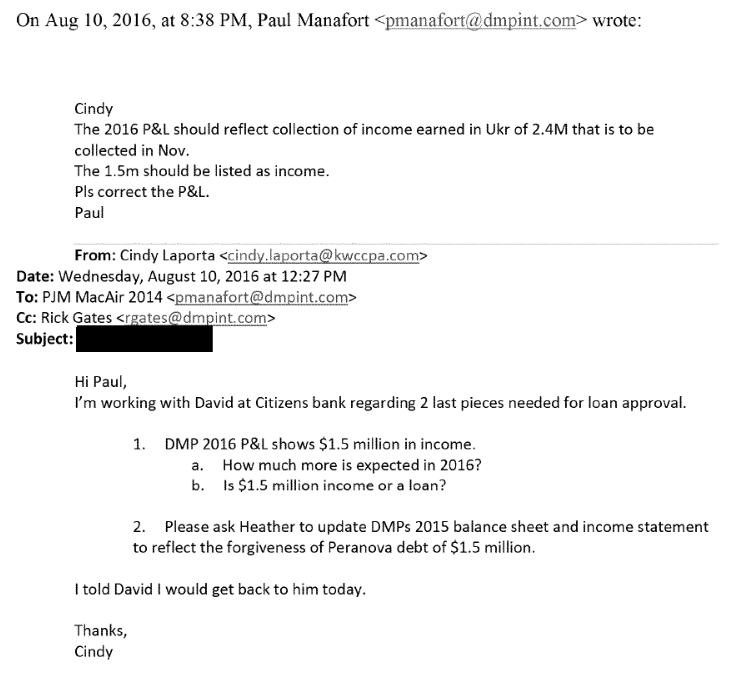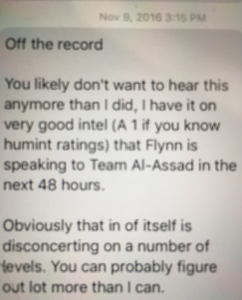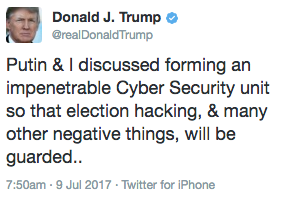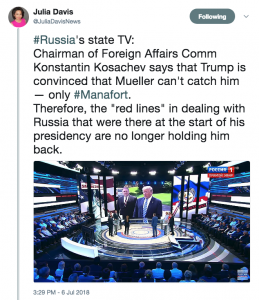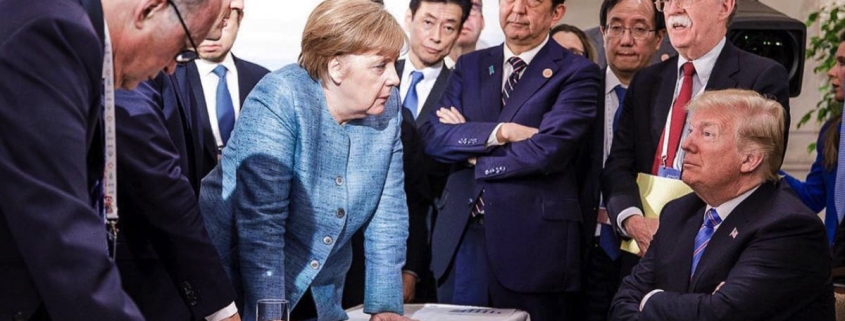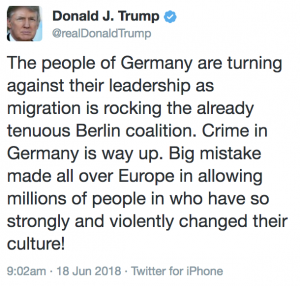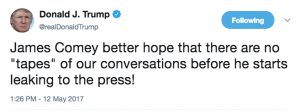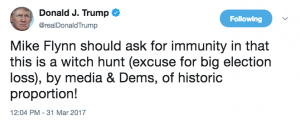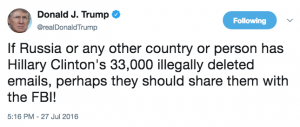The NYT’s Latest McGahnObstructAPalooza: Sometimes “Cooperation” Is Just Cover Your Ass
By far the most telling passage in this 2,225+ word story laying out Don McGahn’s “cooperation” with the Mueller inquiry is this passage:
Though he was a senior campaign aide, it is not clear whether Mr. Mueller’s investigators have questioned Mr. McGahn about whether Trump associates coordinated with Russia’s effort to influence the election.
Over two thousand words and over a dozen sources, and Maggie and Mike never get around to explaining whether Don McGahn has any exposure in or provided testimony for the investigation in chief, the conspiracy with Russia to win the election.
Instead, along the way, Maggie and Mike repeat some version of “obstruction” fourteen times –obstruct obstruct obstruct obstruct obstruct obstruct obstruct obstruct obstruct obstruct obstruct obstruct obstruct obstruct — perpetuating the grossly misleading myth, once again, that Trump and his cronies are only at risk for obstruction charges. They do so even while describing a lawyer who represents three high placed witnesses in the case (along with McGahn, William Burck represents Reince Priebus and Steve Bannon) opining that the President’s legal exposure makes cooperation “insane.”
Mr. Burck has explained to others that he told White House advisers that they did not appreciate the president’s legal exposure and that it was “insane” that Mr. Trump did not fight a McGahn interview in court.
Along the way, the story engages in other kinds of spin, all of which happens to make Don McGahn look far better than he should.
White House Counsels have limited attorney-client privilege
A big part of this tale is premised on the notion that McGahn cooperated when he otherwise might not have had to, based on claims like this:
For a lawyer to share so much with investigators scrutinizing his client is unusual. Lawyers are rarely so open with investigators, not only because they are advocating on behalf of their clients but also because their conversations with clients are potentially shielded by attorney-client privilege, and in the case of presidents, executive privilege.
For a story that discusses John Dean explicitly, this claim is sheer malpractice. White House Counsels work for us, not for the President as private citizen, and as such, have limited attorney-client privilege, something that has now been litigated.
The story admits McGahn might have legal exposure, but doesn’t explain what that is
Much of the rest of the story is spun around an admittedly interesting tension, John Dowd’s decision to “cooperate” with the Mueller probe, including to make no executive privilege claims over McGahn’s testimony (which he could have done). As the story makes out, that led McGahn and the lawyer he hired because he thought he might have some criminal exposure, Burck, to worry about his criminal exposure.
Mr. McGahn and his lawyer, William A. Burck, could not understand why Mr. Trump was so willing to allow Mr. McGahn to speak freely to the special counsel and feared Mr. Trump was setting up Mr. McGahn to take the blame for any possible illegal acts of obstruction, according to people close to him. So he and Mr. Burck devised their own strategy to do as much as possible to cooperate with Mr. Mueller to demonstrate that Mr. McGahn did nothing wrong.
And in a piece claiming McGahn worried Trump would blame him for any legally sketchy behavior, this paragraph shows McGahn instead blaming Trump.
In fact, Mr. McGahn laid out how Mr. Trump tried to ensure control of the investigation, giving investigators a mix of information both potentially damaging and favorable to the president. Mr. McGahn cautioned to investigators that he never saw Mr. Trump go beyond his legal authorities, though the limits of executive power are murky.
Yet the NYT doesn’t seem to think about why McGahn and the three-witness lawyer alarmed at the President’s legal exposure might also think he, McGahn, had legal exposure.
The problems with Don McGahn’s Flynn story
One bit of legal exposure that the NYT has provided evidence for — but confused as yet more actual legal discussion — is in McGahn’s role in the Mike Flynn firing (which the NYT inexplicably always treats as obstruction of justice).
Mr. McGahn gave to Mr. Mueller’s investigators, the people said, a sense of the president’s mind-set in the days leading to the firing of Mr. Comey; how the White House handled the firing of the former national security adviser, Michael T. Flynn; and how Mr. Trump repeatedly berated Mr. Sessions, tried to get him to assert control over the investigation and threatened to fire him.
As I have noted, the White House materials published by the NYT actually show that McGahn wrote an obviously misleading explanation for the Flynn firing, one that suppressed transition period emails that would undermine all the claims about Flynn deciding to lie about his discussion with Sergi Kislyak, and one which would conflict in material ways with the contemporaneous reports of Jim Comey, Sally Yates, and a number of other DOJ witnesses.
- Don McGahn wrote a memo on the lead-up to Flynn’s firing two days after the firing, and one day after Trump’s “let it go” conversation with Jim Comey. It appears to be inconsistent with Transition materials, particularly an email showing (among other things) that Reince Priebus knew in real time what Flynn told Kislyak on December 29. Firing Comey would have been an effort to prevent FBI from discovering those transition period communications.
[snip]
Yates’ public testimony (to which Mary McCord would also be a witness) adds several elements to McGahn’s: she said the sanction discussion itself was wrong (elsewhere HPSCI has claimed she raised Logan Act violations). She talked about concerns about Pence’s credibility (remember–the White House doesn’t address getting Pence’s side of this story at all). And she claims she specifically suggested the White House should take action — that is, fire Flynn.
Finally, note that this passage cites an email chain dated January 12 — what was treated as campaign production with the Bates stamp “DJTJFP.” This is the only time the letter cites that production; they don’t, for example, cite the email chains referenced in Flynn’s plea that make it clear how hard it would have been to forget the Kislyak call because he was basically acting on orders from the President.
[snip]
After Yates spoke to McGahn, he had a meeting with Trump and Priebus and others.
On January 26, 2017, Mr. McGahn briefed the President concerning the information conveyed by Ms. Yates. Additional advisors were brought in, including White House Chief of Staff Mr. Priebus. It was agreed that additional information would be needed before any action was taken. As recorded by Mr. McGahn, “Part of this concern was a recognition by McGahn that it was unclear from the meeting with Yates whether an action could be taken without jeopardizing an ongoing investigation.” At that time “President Trump asked McGahn to further look into the issue as well as finding out more about the calls.”
Note how important it is that the letter ignore Yates’ public statements? She claims she suggested the White House should take action, meaning they should fire Flynn. The White House claimed (in a piece written after the “let it go” conversation) that they didn’t know whether they could fire Flynn because there might be an ongoing investigation. And Trump used that as an excuse to get more information on the investigation.
McGahn may have spent 30 hours blaming Trump for writing this obvious retrospective CYA piece (one piece of news in this piece is that McGahn has been called by for a third appearance by Mueller’s team, but the story doesn’t reveal when that was). But he wrote it. And he likely has some legal risk for having done so.
Sometimes cooperation is just a failure to obstruct
Which is one of my gripes with this story overall. In spite of describing how McGahn and his lawyer worried about the former’s legal exposure, exposure that led them to embrace the ability to appear before Mueller directly, the whole theme of this story is that McGahn “cooperated” with Mueller’s inquiry. The word, in some legal contexts, may mean “responded to legal requests in a way that limited a person’s own criminal exposure” and in others may mean “helped convict co-conspirators.”
In this story, the former connotation is used though the latter connotation is sold. Because the story doesn’t explain the difference in connotations, it makes McGahn look far more cooperative than he has necessarily been.
I mean, maybe he has been. But to make that case, you’d need to ask that basic question: is he also answering questions about the election conspiracy, questions that likely go beyond his own legal exposure?
Mueller can lay out Trump’s actions in an indictment listing him as a non-indicted witness or an Unindicted Co-Conspirator
There are two other details, regular features of Maggie and Mike’s stories on what White House lawyers tell them to say, that are pure PR. First (because people on Twitter never understand this point), Maggie and Mike repeat something that Rudy Giuliani appears to have them chanting in their sleep, that the end product of this investigation is going to be a report to Congress.
Mr. Mueller has told the president’s lawyers that he will follow Justice Department guidance that sitting presidents cannot be indicted. Rather than charge Mr. Trump if he finds evidence of wrongdoing, he is more likely to write a report that can be sent to Congress for lawmakers to consider impeachment proceedings.
Thus far, Mueller has obtained four indictments and five guilty pleas, each laying out some potentially criminal conduct of associates. Indeed, the most recent indictment included this language, making it clear that Russian hackers responded to Trump’s request that Russia hack Hillary by … attempting to hack Hillary.
For example, on or about July 27, 2016, the Conspirators attempted after hours to spearphish for the first time email accounts at a domain hosted by a thirdparty provider and used by Clinton’s personal office. At or around the same time, they also targeted seventy-six email addresses at the domain for the Clinton Campaign.
That is, we’ve already seen nods towards Trump’s involvement in a conspiracy, without any report to Congress. Laying out Trump’s criminal actions as unindicted conduct in indictments has several legal advantages over just reporting it to Congress, including it would raise the stakes on pardoning any co-conspirators and potentially force Trump to sit for an interview. Moreover, indictments are how Mueller has communicated thus far, and how Rod Rosenstein has said they intend to communicate. So perhaps the NYT should stop simply repeating Rudy’s spin on this point?
Trump has demonstrably not provided unparalleled cooperation
Finally, Maggie and Mike include these three paragraphs uncritically in their piece.
Mr. Dowd said that cooperation was the right approach but that Mr. Mueller had “snookered” Mr. Trump’s legal team. The White House has handed over more than one million documents and allowed more than two dozen administration officials to meet with Mr. Mueller in the belief that he would be forced to conclude there was no obstruction case.
“It was an extraordinary cooperation — more cooperation than in any major case — no president has ever been more cooperative than this,” Mr. Dowd said, adding that Mr. Mueller knew as far back as October, when he received many White House documents, that the president did not break the law.
As the months passed on, the misinterpretation by Mr. McGahn and Mr. Burck that the president would let Mr. McGahn be blamed for any obstruction case has become apparent. Rather than placing the blame on Mr. McGahn for possible acts of obstruction, Mr. Trump has yet to even meet with the special counsel, his lawyers resisting an invitation for an interview.
As I have laid out, it is simply not the case that Trump has “more cooperation than in any major case.” George Bush’s White House provided similar cooperation in the (less major) CIA leak case, even before you fluff the numbers by counting texts as pages of documents. But that’s assuming something that this passage makes clear you can’t assume: that Trump will ever sit for an interview. Both Dick Cheney and George Bush were willing to sit for interviews; the former even did so under oath.
Compare that to the Plame affair leak investigation, when Bush sat for an interview in June 2004, and Cheney — who himself made some grossly false statements in his tenure — sat for one in May 2004 and a little-known follow-up that August. According to Cheney’s autobiography, “[T]he second session was conducted under oath so that [his] testimony could be submitted to the grand jury.” Zeidenberg, for his part, doesn’t remember any of those interviews requiring a subpoena.
Samborn, the Fitzgerald spokesperson who was famously reticent during the whole CIA leak investigation, offered an expansive rebuttal to Dowd’s claim that this White House has offered unprecedented cooperation. “Trump’s team can claim all the cooperation it wants, and whether justifiably so or not, it seems to me that it all gets negated, if at the end, he personally refuses to be questioned when so much substance depends on what he knew and did, as well as his state of mind.”
Any refusal to sit for an interview, Samborn said, was central evaluating the level of cooperation.
At some point, the NYT might stop repeating breathless stories premised on the notion that Trump will ever sit for an interview and instead report the fact — that Trump has refused the kind of cooperation with a legal investigation his predecessors have offered.



